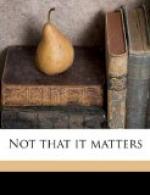Of his attitude towards Christmas cards I cannot speak with certainty, but I fancy that he does not bring these down the chimney too; the truth being, probably, that it is he who composes the mottoes on them, and that with the customary modesty of the author he leaves the distribution of them to others. “The old, old wish—a merry Christmas and a happy New Year” he considers to be his masterpiece so far, but “A righte merrie Christemasse” runs it close. “May happy hours be yours” is another epigram in the same vein which has met with considerable success. You can understand how embarrassing it would be to an author if he had to cart round his own works, and practically to force them on people. This is why you so rarely find a Christmas card in your stocking.
There is one other thing at which Father Christmas draws the line; he will not deliver venison. The reindeer say it comes too near home to them. But, apart from this, he is never so happy as when dealing with hampers. He would put a plum-pudding into every stocking if he could, for like all jolly old gentlemen with nice white beards he loves to think of people enjoying their food. I am not sure that he holds much with chocolates, although he is entrusted with so many boxes that he has learnt to look on them with kindly tolerance. But the turkey idea, I imagine (though I cannot speak with authority), the turkey idea was entirely his own. Nothing like turkey for making the beard grow.
If I believed in Father Christmas I should ask myself what he does all the summer—all the year, indeed, after his one day is over. The reindeer, of course, are put out to grass. But where is Father Christmas? Does he sleep for fifty-one weeks? Does he shave, and mix with us mortals? Or does he—yes, that must be it--does he spend the year in training, in keeping down his figure? Chimney work is terribly trying; the figure wants watching if one is to carry it through successfully. This is especially so in the case of jolly old gentlemen with white beards. I can see Father Christmas, as soon as his day is over, taking himself off to the Equator and running round and round it. By next December he is in splendid condition.
When his billion years are over, when his contract expires and he is allowed a free hand with the presents, I suppose I shall not be alive to take part in the distribution. But none the less I like to think of the things I should get. There are at least half a dozen things which I deserve, and Father Christmas knows it. In any equitable scheme of allotment I should come out well. “Half a minute,” he would say, “I must just put these cigars aside for the gentleman who had the picture post card last year. What have you got there? The country cottage and the complete edition of Meredith? Ah yes, perhaps he’d better have those too.”
That would be something like a Father Christmas.




